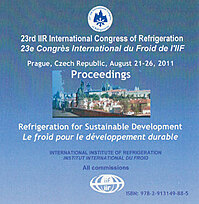
Document IIF
Étude expérimentale sur la performance sous les conditions climatiques néo-zélandaises d'un déshumidificateur muni d'un système de vitesses pour un réfrigérateur domestique.
Experimental investigation of geared domestic refrigerative dehumidifier performance in New Zealand household climates.
Numéro : pap. ID: 148
Auteurs : LOWREY S., CARRINGTON G., SUN Z., et al.
Résumé
Small refrigerative dehumidifiers, which are commonly used in New Zealand to reduce household moisture, typically operate in relatively cool environments, outside their optimum performance envelope. This study investigates the potential for improving the low-temperature drying capacity of a domestic dehumidifier fitted with an evaporator economiser. The paper reports performance measurements on a modified domestic dehumidifier which can be operated either geared with an evaporator economiser, or ungeared. An empirical heat pump model, which was calibrated using the ungeared performance data, was also used to compare the two modes. The measured results show a clear improvement in the dehumidification capacity in the geared mode at the higher temperatures tested, but the performance improvement in the lower temperature tests was less than expected from the model. Shortcomings in the trial and in the dehumidifier model are discussed and ways for resolving them identified.
Documents disponibles
Format PDF
Pages : 9 p.
Disponible
Prix public
20 €
Prix membre*
Gratuit
* meilleur tarif applicable selon le type d'adhésion (voir le détail des avantages des adhésions individuelles et collectives)
Détails
- Titre original : Experimental investigation of geared domestic refrigerative dehumidifier performance in New Zealand household climates.
- Identifiant de la fiche : 30001563
- Langues : Anglais
- Source : Proceedings of the 23rd IIR International Congress of Refrigeration: Prague, Czech Republic, August 21-26, 2011. Overarching theme: Refrigeration for Sustainable Development.
- Date d'édition : 21/08/2011
Liens
Voir d'autres communications du même compte rendu (569)
Voir le compte rendu de la conférence
-
Experimental investigation of geared domestic r...
- Auteurs : LOWREY S., CARRINGTON G., SUN Z., et al.
- Date : 06/2012
- Langues : Anglais
- Source : International Journal of Refrigeration - Revue Internationale du Froid - vol. 35 - n. 4
- Formats : PDF
Voir la fiche
-
Adsorption-desorption behavior of water vapor o...
- Auteurs : TSUIJIGUCHI T., OSAKA Y., KUMITA M., et al.
- Date : 07/08/2017
- Langues : Anglais
- Source : International sorption heat pump conference, ISHPC 2017, Tokyo august 7-10.
Voir la fiche
-
A numerical model for a wet air-side economiser.
- Auteurs : LOWREY S., SUN Z.
- Date : 12/2015
- Langues : Anglais
- Source : International Journal of Refrigeration - Revue Internationale du Froid - vol. 60
- Formats : PDF
Voir la fiche
-
Dehumidifier using lithium chloride aqueous sol...
- Auteurs : IYOKI S., YOSHIDA O., YAMASHITA T., et al.
- Date : 17/08/2003
- Langues : Anglais
- Source : 21st IIR International Congress of Refrigeration: Serving the Needs of Mankind.
- Formats : PDF
Voir la fiche
-
Waardoor wordt de werking van een dauwpuntkoele...
- Auteurs : JANSSEN M., UGES P. G. H.
- Date : 12/2010
- Langues : Néerlandais
- Source : Koude & Luchtbehandeling - vol. 103
Voir la fiche
